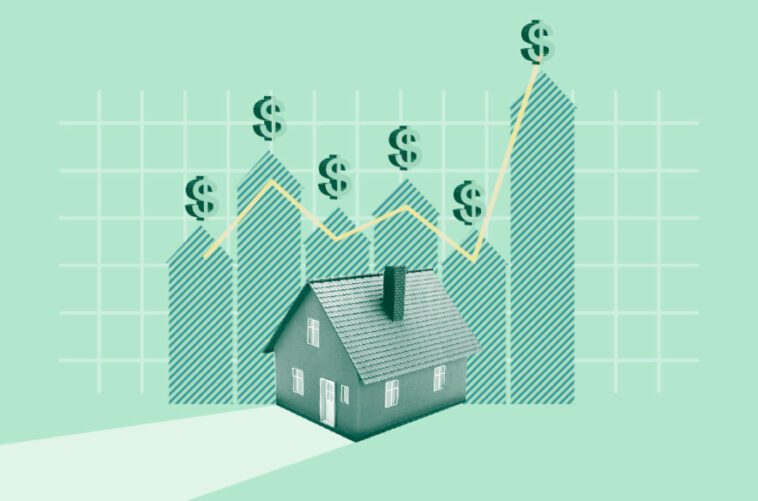Rates for mortgages are determined by a variety of factors, including the risk level assumed by mortgage lenders. The higher the risk, the higher the mortgage rate. These high rates protect lenders by ensuring that, in the event of a default, they’ll be paid back more quickly. Mortgage rates also vary from day to day, depending on a number of factors, including your credit score.
Interest rates for mortgages change every day
In recent months, we’ve heard a lot about the slowing housing market and rising interest rates. While the two are certainly related, rising rates should be seen in a larger context. In the 1980s, mortgage rates were as high as 18%. In the past, the rates have tended to rise more quickly when the economy is in recession.
The best way to track the latest mortgage rates is to call your lender or check the market online every day. Interest rates are always fluctuating. That is why you should check with your lender before you lock into a mortgage. Even if the lender says the rate is the lowest, you never know for sure.
There are a lot of factors that can affect mortgage rates, including broader economic conditions, monetary actions by the Federal Reserve, inflation, and the bond market. Demand for mortgages also plays a role in determining mortgage rates. A tight lending environment can increase rates, while low demand could lead to lower rates.
Although mortgage rates are not likely to change overnight, they can change significantly. The number that was posted on Monday could be drastically different by the time you apply on Friday. This means that if you are chasing the lowest rates possible, you should be patient and understand the risks. Locking in a good rate can be a complex process, but it can be relatively painless if you use a reputable mortgage lender.
They are based on bond prices in the mortgage-backed securities market
The interest rates on mortgages are based on the prices of mortgage-backed securities, which are traded in the bond market. The prices of MBS vary every day based on economic and political events. It is therefore crucial to follow the movements of the market in order to determine the best mortgage interest rates.
In general, rates for mortgages follow the same upward and downward trajectory as bonds. This is because mortgage-backed securities investors are always trying to guess when borrowers will repay their loans. In times when the economy is doing well and inflation is spiking, rates for mortgages will rise as mortgage lenders anticipate that their MBS investors will demand higher yields.
Mortgage-backed securities come in two flavors: agency and corporate. The former provides more prepayment protection, while the latter offers less. A mortgage backed by an agency can be prepaid due to life events or refinancing, which can be a major financial decision.
Mortgage rates are affected by the price of bonds and the price of Treasuries. Mortgage rates rise and fall in opposite directions, which means that the yield on mortgages is also affected by inflation.
They are based on credit score
Your credit score plays a big part in determining the mortgage interest rate you will be charged. Keeping your credit score high can save you thousands of dollars over the life of the loan. Credit scores are calculated based on the number of items on your credit report, and the higher your score, the lower the mortgage interest rate you will pay.
Most mortgage lenders use the FICO scoring model to determine your credit worthiness. Your score will be based on a number of factors, including your payment history, your credit mix, and the age of your credit accounts. Even a few points difference can greatly affect your mortgage payments.
Your debt-to-income ratio is another factor lenders consider when determining your mortgage rates. If you have less than 20% of your income in debt, you will have a lower credit risk. A low-to-income ratio will help you afford the mortgage payments. However, if you have a high debt-to-income ratio, your mortgage rate will be higher than if you have low debt-to-income ratio.
Mortgage rates are subject to change, but you can expect to see rates around average. Depending on your credit score, down payment amount, and other factors, you can get a lower or higher rate. Money’s daily mortgage rates are national averages, based on a 20% down payment, no points, and a 700 credit score. However, individual rates will vary based on the borrower’s financial information, lender, and location.
They are based on down payment
When shopping for a mortgage, you need to keep in mind that the amount of down payment you have is a key factor in the interest rate. A larger down payment reduces your monthly payment and minimizes other monthly expenses, like private mortgage insurance (PMI). Different loan programs require different amounts of down payment, so it is important to compare all costs and options before making a decision. A good rule of thumb is to put 20% or more down.
The down payment is the first payment you make when purchasing a home. It is typically part of your personal savings, or can be from an eligible gift. Traditionally, the down payment for a mortgage is 5% of the total purchase price. A down payment of 20% or more is a good idea, as it shows you’re committed and financially prepared for the purchase.
The amount of down payment that you put down on a mortgage will affect your monthly payments and determine your lifestyle. Making a large down payment will allow you to have more money each month for other expenses such as mortgage payments, property taxes, insurance, maintenance, and potential repairs. In addition, a large down payment will also result in a lower loan-to-value ratio (LTV), which means lenders will charge you lower interest rates.
They are based on upfront costs
The interest rate is the amount you pay for a mortgage and is usually advertised as a percentage of the total loan amount. You can also look at the APR (annual percentage rate), which includes interest rate and other costs, and gives you a more accurate idea of how much it will cost to finance your mortgage. The APR will be higher with lenders that charge higher upfront costs. The Federal Truth in Lending Act requires that lenders provide this information.
Mortgage rates include two types of fees: interest and points. These fees cover specific services for which the borrower is paying. In some cases, the borrower must pay points to obtain a lower interest rate. Another type of upfront cost is mortgage insurance. This premium must be paid if the borrower is not able to make a large down payment.



